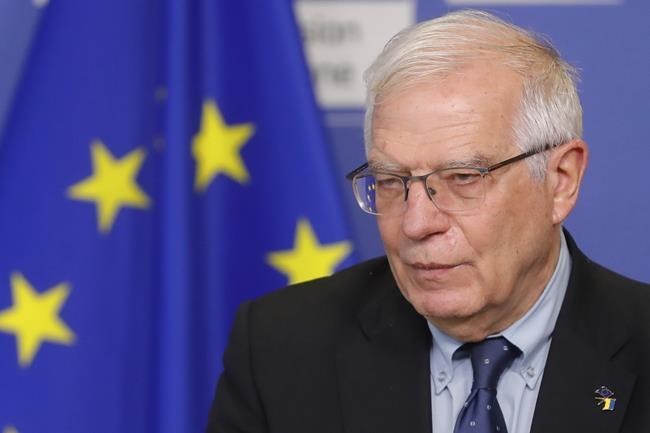DUBAI, United Arab Emirates (AP) — The European Union's foreign policy chief said Friday that “a pause” was needed in ongoing talks over Iran's tattered nuclear deal with world powers, blaming “external factors” for the delay.
The comments by Josep Borrell come as a roadmap appeared imminent for the U.S. to rejoin an accord it unilaterally withdrew from in 2018 and for Iran to again limit its rapidly advancing nuclear program. And while Borrell didn't elaborate, it also comes as Russia last week tied the ongoing negotiations to sanctions Moscow faces over its war on Ukraine.
"A pause in (hashtag)ViennaTalks is needed, due to external factors. A final text is essentially ready and on the table,” Borrell wrote on Twitter. “As coordinator, I will, with my team, continue to be in touch with all (hashtag)JCPOA participants and the U.S. to overcome the current situation and to close the agreement.”
The JCPOA, or the Joint Comprehensive Plan of Action, is the 2015 nuclear deal's formal name. Talks have been going on for months in Vienna over trying to come up with a way to restart the deal.
Responding to Borrell, Iranian Foreign Ministry spokesperson Saeed Khatibzadeh said the pause “could be a momentum for resolving any remaining issue and a final return.”
“Successful conclusion of talks will be the main focus of all,” Khatibzadeh wrote on Twitter. “No external factor will affect our joint will to go forward for a collective agreement.”
Khatibzadeh as well did not identify the “external” issue. However, Iran has been careful in the waning days of the talks not to upset Russia, which it views as an ally against the U.S.
Iran also partnered with Russia in Syria to support President Bashar Assad. But historic distrust between the nations also remains over Russia's invasion of Iran during World War II and later refusing to leave afterward.
A report by Iran's state-run IRNA news agency, quoting an anonymous source it described as close to Tehran's negotiators, also suggested Russia's demands caused the pause.
“There are some issues such as the issues between Russia and the United States, which, of course, will be unrelated to the issue of Iran’s talks … and that need to be resolved between the U.S. and Russia,” IRNA quoted the source as saying.
However, Russian ambassador to Vienna Mikhail Ulyanov, speaking to journalists outside of the Vienna hotel where the talks took place, said: “I'm not aware of any impasse.”
“Contacts will continue,” he said. “The conclusion of the deal does not depend on Russia only.”
In Germany, Foreign Ministry spokeswoman Andrea Sasse also said “the work is done” in terms of an agreement, but decisions needed to be made in foreign capitals.
“We hope and expect that this will now happen,” Sasse said.
On Thursday, State Department spokesperson Ned Price had said America was “close to a possible deal — it’s really down to a very small number of outstanding issues.”
But last week, Russian Foreign Minister Sergey Lavrov said he wanted “guarantees at least at the level of the secretary of state” that the U.S. sanctions would not affect Moscow’s relationship with Tehran. That threw into question the months of negotiations held so far on restoring the 2015 deal, which saw Iran agree to drastically limit its enrichment of uranium in exchange for the lifting of economic sanctions.
“The new Russia-related sanctions are wholly unrelated to the JCPOA and should not have any impact on a potential mutual return to compliance with it or its ultimate implementation,” Price said Thursday.
“We also have no intention of offering Russia anything new or specific as it relates to the (Ukraine) sanctions, nor is anything new required to successfully reach an agreement on a mutual return to full compliance with the” deal.
The 2015 nuclear deal saw Iran put advanced centrifuges into storage under the watch of the International Atomic Energy Agency, while keeping its enrichment at 3.67% purity and its stockpile at only 300 kilograms (661 pounds) of uranium. It also halted enrichment at its underground Fordo nuclear facility.
But then-President Donald Trump unilaterally withdrew America from the accord in 2018, fulfilling a campaign pledge to tear up the deal as it didn’t address Iran’s ballistic missile program and support for regional militias. Iran in 2019 then began methodically breaking all the deal’s limits as a series of escalating attacks put the wider Mideast on edge.
As of Feb. 19, the IAEA says Iran’s stockpile of all enriched uranium was nearly 3,200 kilograms (7,055 pounds). Some has been enriched up to 60% purity — a short technical step from weapons-grade levels of 90%. Meanwhile, Iran has stopped the IAEA from accessing its surveillance camera footage and has resumed enrichment at Fordo.
That worried nuclear nonproliferation experts. While Iran insists its program is peaceful, the IAEA and Western governments say Iran had an organized military nuclear program up until the end of 2003.
Trump left office without ever meaningfully engaging in diplomacy with Iran over the nuclear deal. President Joe Biden entered the White House last year, saying he was willing to see America rejoin the agreement.
Seeing Iran able to sell its crude oil and natural gas in the global market also could push down energy prices. Americans now are paying the highest-ever prices at the pump for gasoline, fueled by Russia's war on Ukraine.
___
Associated Press writers Matthew Lee in Washington, Amir Vahdat in Tehran, Iran, and Geir Moulson in Berlin contributed to this report.
Jon Gambrell, The Associated Press


